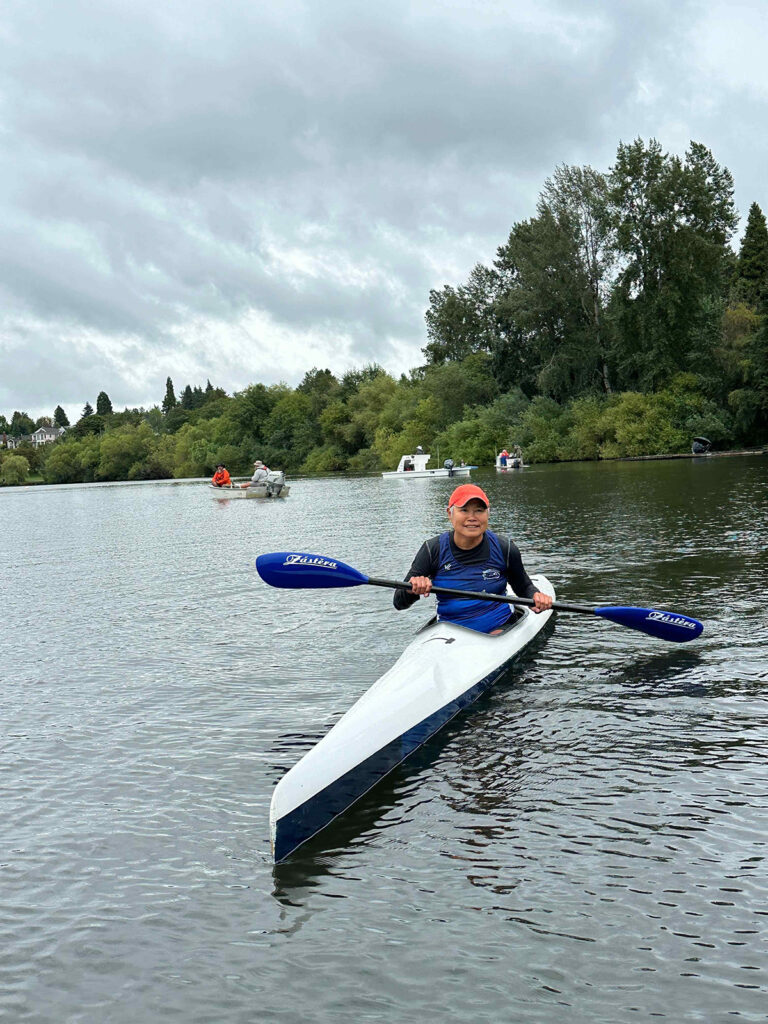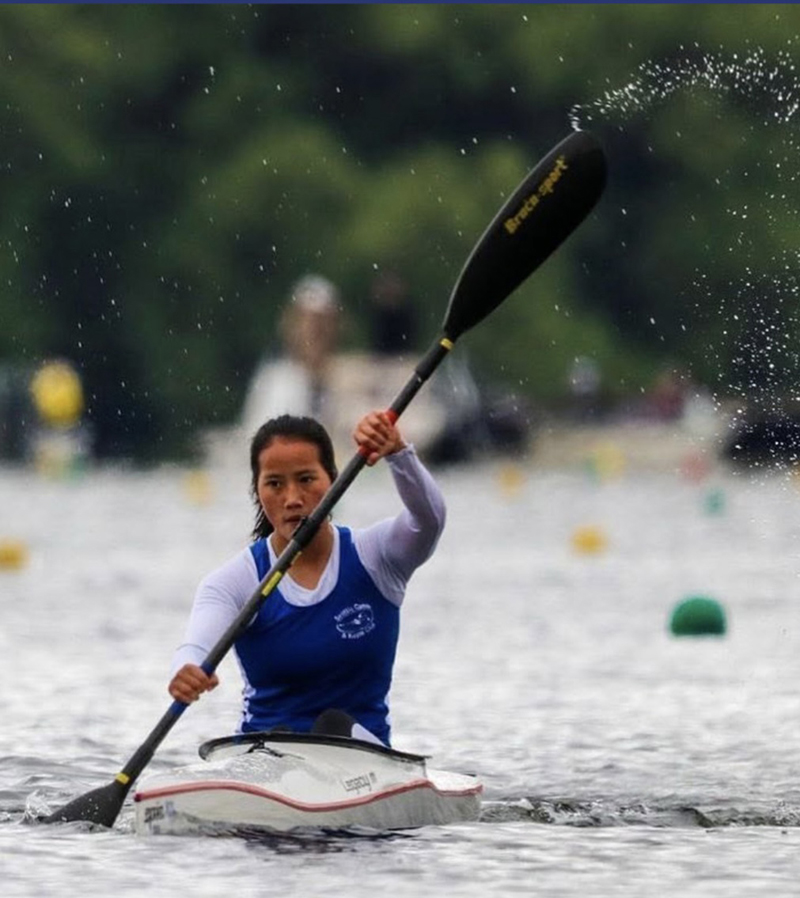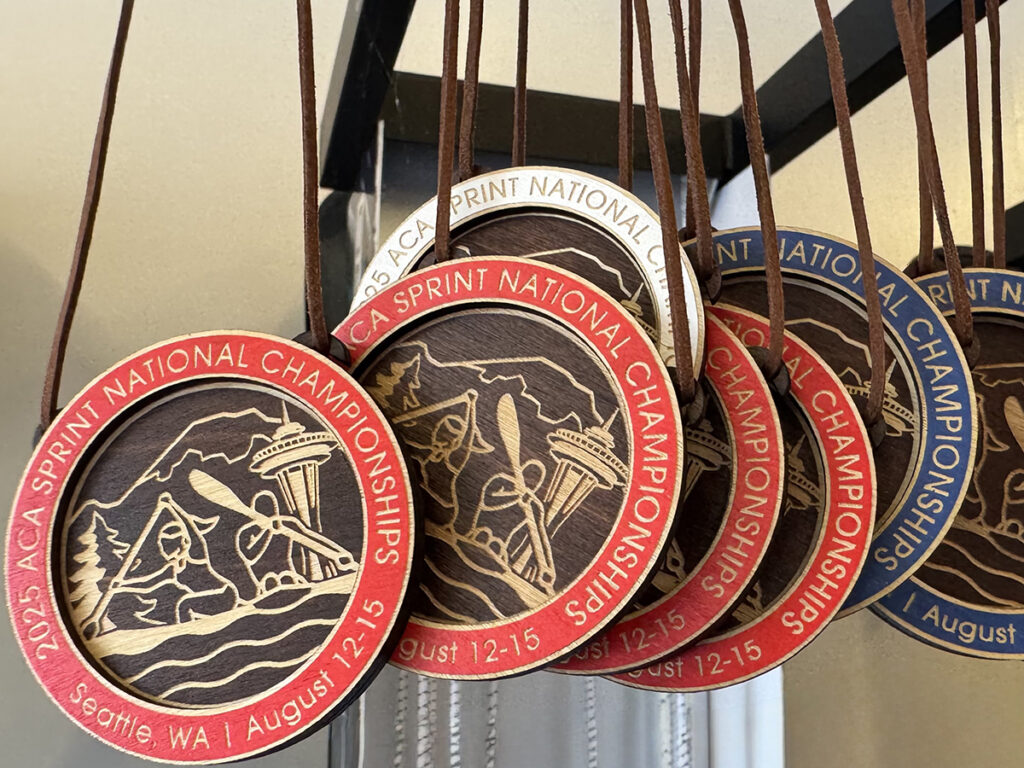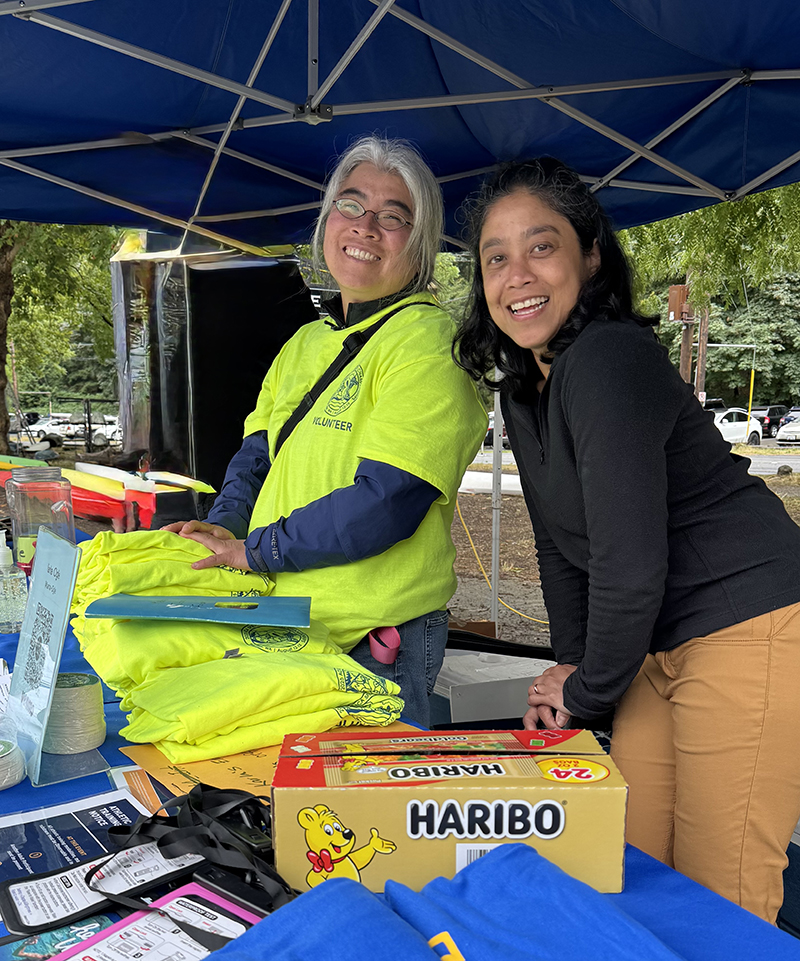By Becky Chan
NORTHWEST ASIAN WEEKLY
“Your paddle is upside down,” someone yelled to me from the dock, as I prepared to paddle to the starting line of the 500-meter race. Thus began my sprint kayaking competition journey in the 2025 American Canoe Association Sprint National Championship, held on Aug. 12–15, at Green Lake in Seattle.
I had no idea what sprint kayaking was three months ago. This spring, my neighbor, Kathy, told me she had signed up for a sprint kayaking class at Green Lake.
“That sounds intense,” I replied.
“No, no, we just paddle around the lake, but you DO use a lot of your core. Great exercise,” she explained.
It piqued my interest. My mind has been muddled by events around the world; I needed a distraction. A competitive runner for most of my life, with years of pounding my legs, plus various injuries to my knees, I no longer race. I plod. Kayaking seems low impact, compared to running or biking where I had been hit by a car, other cyclists, and car doors. The landing would be much softer on the water.
I found the sprint kayak class on the Seattle Canoe and Kayak Club (SCKC) website. For $33 a month paddling every Sunday, it was a bargain. I signed up for May and got a senior discount, $29! Boat, paddle, and personal floatation device (PFD) are provided. And there’s coaching. If I just make it to one or two classes, it would be worth it. The venue being a short bike ride from my house was a plus.
I talked my adventure buddy, Allison, into joining me. She jumped at the chance to play in the water in the warm weather. Our plan was to enjoy the lake, then go to lunch.
To take the class, students must pass a float test by treading water or swimming in place for 10 minutes, dressed in a long sleeve shirt and long pants. At the end of the 10 minutes, students would need to be able to put on the PFD in the water.
My first Sunday class was a sunny 80 degrees and a perfectly calm day at the lake. The Green Lake Small Craft Center held numerous kayaks for different purposes and abilities. Breona Gutschmidt, one of the coaches, explained the paddling technique, helped us first timers pick out kayaks, and adjusted the seat.
As beginners, we used surfskis, which are long and narrow kayaks. They have foot-controlled pedals connecting to the rudder for steering. Both the pedals and seats are adjustable to fit the kayaker to maximize power. They are made to surf in the ocean, not flat-water Green Lake. Because they are heavier and more stable than the sprint kayaks, they are good for beginners to learn paddling strokes. They are not as tippy for the newbies, but still require the right balance, technique, and posture to get in and out of the boat. Flopping like a seal onto the dock was my first experience freeing myself from the kayak. Trying to be one with the kayak but completely missing the boat and into the water was my other.
By the third class, I got more comfortable. I signed up for another set of classes in July.

Becky Chanb stayed upright and finished all seven of the races she entered. An athlete can enter 10 races in the nationals. (Photo by Lina Tsong)
During the class sessions, members of the SCKC would paddle with us. Some were just out enjoying the lake, while others were training for the nationals in August.
“You can help us score team points for the masters,” Julie Roberts, a veteran SCKC member who happened to be paddling with us, egged me on. “All you need to do is stay upright and finish the race.”
It sounded like a challenge.
With less than two weeks to go, I joined the American Canoe Association (ACA) and became a SCKC masters team member to race in the nationals.
Coach Eli Holmes, who rowed for Stanford University, said to me, “You’ll have to race in a sprint kayak. Surfskis are not allowed in nationals.”
The lighter sprint kayaks are faster but less stable. Eli helped me get used to racing by paddling with me in a tandem, the K2. She wanted us to compete in the 500-meter race. The master races are 200-meter, 500-meter, 1000-meter, and 5000-meter. There are various combinations of distance, boat size, and gender, as in mixed masters (men and women in the same boat), all women, or all men. K1 is for a single paddler, K2 for two, and K4 for four.
I have a tee shirt imprinted with “Life begins at the end of your comfort zone.” Now I know why it’s my favorite shirt. How often would I get to be in a national regatta in my own backyard? And with former Olympians or future Olympians? Go SCKC!
Speaking of Olympians, Greg Barton, four-time Olympic medalist in the 80s and 90s, is in MY club. Barton and his wife, Justine, met paddling for SCKC. Justine is the current president of the advisory board of SCKC. Another Seattleite, Aaron Small, a recent University of Washington graduate, competed in the 2024 Paris Olympics. Small came from the youth developmental program of SCKC. Although the family has moved to Camano Island, father Steve continues to compete for the Seattle club. Sprint canoeist Nevin Harrison won silver in the 2024 Paris Olympics and gold in Tokyo 2020. Harrison began her Olympic journey at the SCKC youth program.

Bellevue’s Nora Tsong is a fierce competitor in the local and national level. (Photo by Schonna Schenk)
The SCKC youth program continues to produce stellar athletes. Nora Tsong and her twin sister, Emma, began paddling as 10-year-olds when they lived in Seattle. They have since moved to Bellevue and graduated from high school. Emma is taking some time off from paddling but still supports the team. Nora was selected to attend the 2024 Olympic Hopes Regatta (OHR) in Hungry, a regatta featuring 15- to 17-year-old Olympic hopefuls from all over the world.
“It was a good international experience. I got to exchange a shirt with a competitor from Sweden,” Nora exclaimed.
SCKC’s Soren Ogle is the 2025 OHR participant in the Czech Republic from September 18-21. The Ogles conveniently live in Green Lake and are deeply involved with SCKC.

Paul Clements of Bellingham made these wooden medals for the National Championship. SCKC Youth and Masters teams won many. (Photo by Becky Chan)
The club is mostly run by volunteers. They and the coaches deserve gold medals themselves. Several youth and masters coaches share administrative and training duties. They are paddlers who still compete internationally or in their age groups. Head coach of the Junior Sprint Racing team, Andreea Ghizila, is currently competing in the Senior World Championship in Italy. Junior coach Mark Parrish, Masters coach Eli Holmes, and SCKC member Luis Buen Abad are set to compete in the Masters Canoe Marathon World Championship in Hungary this week. The event will include both sprint canoes and kayaks.
Many volunteers, like the Ogles, are dedicated parents who have children in the club’s co-ed youth sprint team, from grade 6 to college age.
Vitri Parson’s son, Miles, has been paddling for SCKC the last two years. He is a 10th grader and competes on the Junior sprint team. Vitri proudly showed me photos of Miles’ transformation from a wild-haired child to a young man.
“It does become part of our lives,” Vitri said, “I take and pick him up for morning practices. Jon (her husband) does the afternoon/evening pickups. Six days a week for morning practices and three afternoon practices all summer long. There’s less practice during fall, winter, and spring.”
Many of the parents also volunteer during the club’s informal Friday night Duck Island race and the larger regattas. These devotees watch their children develop their passion and learn to be a part of a team. The children grow not only as an athlete but also as a person.

Volunteer moms Shelly Fujikawa (left, son Ethan Chin) and Vitri Parsons (son Miles). (Photo by Becky Chan)
Shelly Fujikawa’s 7th grade son, Ethan Chin, has been paddling since the fall of 2023.
“Paddling has given Ethan a wonderful community, a great group of friends, and a focus,” Fujikawa said, “It’s also given him, hopefully, a lifelong interest that he can take with him wherever he goes.”
Mingling with the young and old paddlers, I also learned to have a focus and grow as an athlete in a new sport. The paddlers humble me with their perseverance and dedication, whether they’re out enjoying a Sunday paddle or competing in a race. I don’t know how often I will compete, but I will always savor the days of going beyond my comfort zone with the support of my new community.

